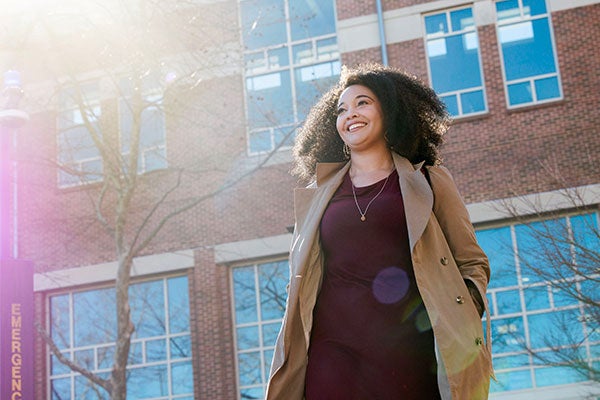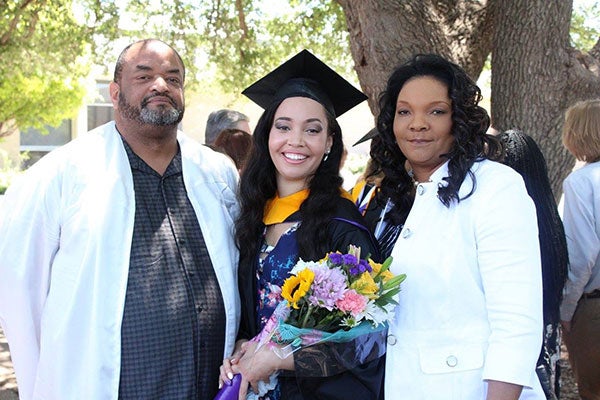Pirate Determination
Counseling student overcomes major health obstacles to make a difference
Immediately after recovering from major brain surgery, what better thing to do than move halfway across the country and start a doctoral program in counseling at East Carolina University?

Briana Toplin. (ECU photo by Steven Mantilla)
That was Briana Toplin’s choice, and it seems a good one — for her and her future clients.
Toplin was born and raised, along with her younger sister, mostly in central Texas, with a short break in Minnesota, by a mother in business and an electrical engineer father.
In high school Toplin said she was just as awkward as everyone feels they are — “tall, lanky, with attention deficit disorder and likely on the autism spectrum.”
She found solace in her high school choir and her church.
Her undergraduate experience at Abilene Christian University was tempestuous. Every semester someone close to her died, including her uncle at home in Fort Worth who was murdered during her first week of school. She sang in the school choir to distract herself from a lack of grounding until graduating in 2017.
“How in the world I got here, sometimes I have no idea,” Toplin said.
Just as she was starting her master’s program at Texas Christian University, things got hard. And confusing. And eminently dangerous. Her car was T-boned, which led to migraines. Tests showed she had a rare structural skull malformation called Chiari Malformation Type 1, which pushed on her brain and created problems, such as not being able to participate in extreme activities.
“Never going on roller coasters, being mindful when going on airplanes — anything with too much pressure in my brain, don’t do it,” Toplin said.
A misunderstanding about how her new diagnosis should be handled nearly ended in the suspension of the balance of her Masters-level counseling education — the practical, in-person counseling sessions — until after her medical situation could be addressed. That wasn’t the right answer, so she advocated for herself and pushed through to graduate in 2022, just in time for what she called a “nice graduation present” — brain surgery.
“Friday was the hooding ceremony for the College of Education. Saturday, I walked across the stage at the big graduation. Monday, I moved apartments. Wednesday, I had brain surgery,” Toplin recalled.
Moving On
Toplin’s long-term goal is to help other counselors deal with the massive burden of absorbing their clients’ trauma through the counseling process because “folks burn out.” But to get herself into a position to be able to shape the future of counseling, and education of counselors, she needed more schooling. She scoured the websites of national counseling associations to find an accredited program that she had the time to apply to and, more importantly, that wanted her.

Briana Toplin poses with her parents Effort and Kathleen after graduation from Abilene
Dr. Paul Toriello, the former director of ECU’s Department of Addictions and Rehabilitation Studies, was in contact with Toplin and reassured her that a crazy idea like driving halfway across the country wasn’t such a crazy idea after all.
“Any question that I had, he answered. Any question that I had for any of the other staff members in the department, they answered it,” Toplin said.
But what sealed the deal on Toplin becoming a Pirate was the department’s commitment to equality. During an online interview with the department’s faculty, she was told the program was completely anti-racist. The textbooks, the faculty and staff – all are committed to bringing equality in counseling services to communities that desperately need them.
“I said in the interview, ‘It does not matter whether you let me know that I’m in today or you let me know that I’m in next week, I’ll see y’all in the fall.’ The next day I get an email that said, ‘You got in. And here is your scholarship for a full ride,’” Toplin said.
“Can you put that in writing?” she asked. “I don’t know who y’all are, but you mean to tell me that little-old Briana from the middle of Fort Worth, Texas, you will pay for me to go and get my Ph.D. and study what I want and support me along the way?”
Dr. Jennifer McDougal, the College of Allied Health Sciences’ director of the rehabilitation services undergraduate program, said Toplin is an inspiration for her infectious energy and desire to be an agent of positive change in the face of the challenges that life has presented her.
“Briana’s tenacity and passion is palpable when you are with her. The challenges she has faced only make her want to work that much harder,” McDougal said.
The actual move to ECU almost didn’t happen. Her moving company told her they couldn’t ship her goods for a month and “a fantastic gentlemen” with ties to North Carolina stepped in and transported her belongings at the last minute.
She arrived in Greenville in August, a week before the start of the new semester and was immediately put to work. She was tasked as a teaching assistant, leading a multicultural class where she had an opportunity to upend the status quo. Only 2% of tenured faculty are black women, and the majority of counseling theories taught in modern classrooms were conceived of by old men who are long dead, which translates to less opportunities for counseling that considers minority experiences and works to address root concerns in non-white communities.
“It’s getting better, with the emphasis on slowly, but it’s getting better,” Toplin said. “But it was difficult for me to go and explain to my classmates over at TCU, ‘Sometimes you want to sit with somebody who looks like you and feel safe.’”

Briana Toplin. (ECU photo by Steven Mantilla)
Toplin is fully aware that the considerations that she feels for marginalized people in need extend to other minority groups. Hispanic, Asian and Native communities have cultural considerations that she knows she doesn’t understand and wouldn’t pretend to understand just as she wouldn’t expect someone who didn’t grow up in a black community to fully grasp the intense gravity of racism, police brutality and maternal mortality rates.
Now that she’s at ECU, Toplin said her horizons have expanded in a million and one directions, but tackling the very hard tasks of getting counseling students to face their own biases has become a rewarding, if sometimes touchy, subject to explore.
“We have a disclaimer in the syllabus that says this class is going to be hard. It’s possibly going to bring up some feelings that you’ll need to process. Find a therapist, go for a walk, touch some grass,” Toplin said.
Teaching is filling her soul, but the possibilities of conducting research or opening her own counseling practice are equally enticing.
Regardless of where her path leads after graduation, simply having the opportunity to be in a classroom to teach students is a blessing, she said. The health scare that she faced before traveling from Texas to North Carolina sharpened her focus and resolve to make a difference in the lives of fellow counselors and the clients they serve.
“You only get one brain,” she said.
Toplin is on track to make very good use of hers.
